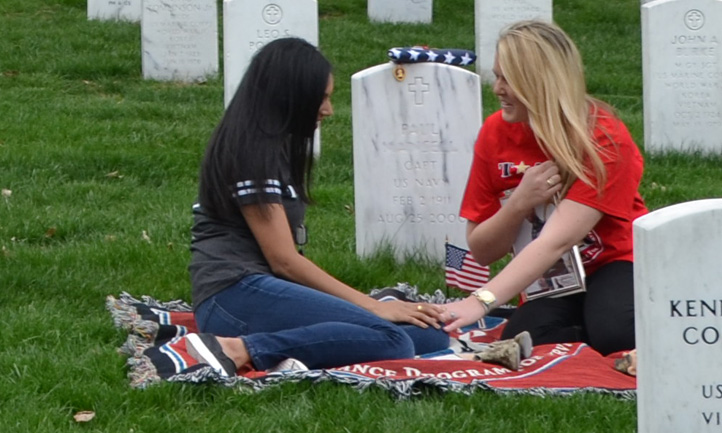Memorial Day: A National Debt, A Personal Price
Author: Emily Munoz
Memorial Day was a first step toward national unity in a deeply divided country. With origins in the aftermath of the Civil War, it was designated for the purpose of “strewing with flowers, or otherwise decorating the graves of comrades who died in defense of their country during the late rebellion, and whose bodies now lie in almost every city, village and hamlet church-yard in the land.” Following this proclamation, on May 30, 1868, Gen. James Garfield made a speech at Arlington National Cemetery, and 5,000 participants decorated the graves of the 20,000 Union and Confederate soldiers buried there. The vibrant hues of spring flowers adorning gravesites served to remind a still-healing country that collective peace requires personal sacrifice.

In 1971, the collective American story resulted in a shared national day of mourning, when Memorial Day was declared a national holiday, ensuring both a three-day weekend and a place in the public conscious.
Still, amid the happy noise of picnics and the chatter of consumerism that seem to accompany any federal holiday, the somber truth is unavoidable. More than 1 million men and women have given their lives for our country. For TAPS families, this tugs at our hearts even more personally. We know that some of them are ours.
As surviving families, even as we experience deep individual grief, we know we are part of this larger American legacy of grief and loss. But how does Memorial Day change for us when the holiday becomes personal?
Military families have always marked Memorial Day with gratitude and gravitas, as is customary when the experiences of loss are an inescapable reality. Yet, for the rest of the country there is no mental parade of names and faces, no catalogue of near misses, and little deeply personalized understanding of the imperative to make their sacrifice matter. Most do not serve on the front lines of hardship tours, forward basing or dangerous training missions. Most enjoy the comfort that someone else stands in constant vigilance over our national freedom.
In many ways, the past 15 years of armed conflict have once again brought the harsh costs of the national defense home on a larger scale. However, in World War II, 12 percent of the population served in the military. Today, that number is less than half of one percent. If the burden is not universal, shouldn't the remembrance at least be?
If you're with us at the National Military Survivor Seminar over Memorial Day weekend, you know that we are able to observe it together, wrapped in love, pride and a sense of reverence. We're able to insulate ourselves from all but the very hardest truth of the day. Instead of using the day to mark the beginning of summer, we pass the day as intended. We visit the graves of our loved ones, remember great love and rededicate ourselves to living lives that honor them every day.
Led by the same grief, remembrance and love, members of our TAPS family all across the nation do the same. We are still part of the communities that raised the everyday heroes who distinguished themselves through their service and sacrifice. While the military community's charge is to "never forget," the American public's charge is to try to know. This gives us the unique opportunity to tell our stories - to provide a personal imperative to savor summer days, to be present with loved ones and to live lives worthy of great sacrifice.
We who have experienced this aching loss do not ask that there be sadness or that people forego the backyard barbecues. We know there is honor in celebrating - with as much joy as possible - the freedoms that some have purchased and defended with their lives.
For us, Memorial Day is every day. The loss that is recognized for a moment by our fellow citizens on the last Monday in May is ours to bear, with pain and pride, forever.
Since your loss, how has Memorial Day changed for you? How do you share with those around you on this national holiday to help make your hero and all the fallen heroes personal to our nation?
By Emily Munoz, Strategy & Communications Senior Advisor
